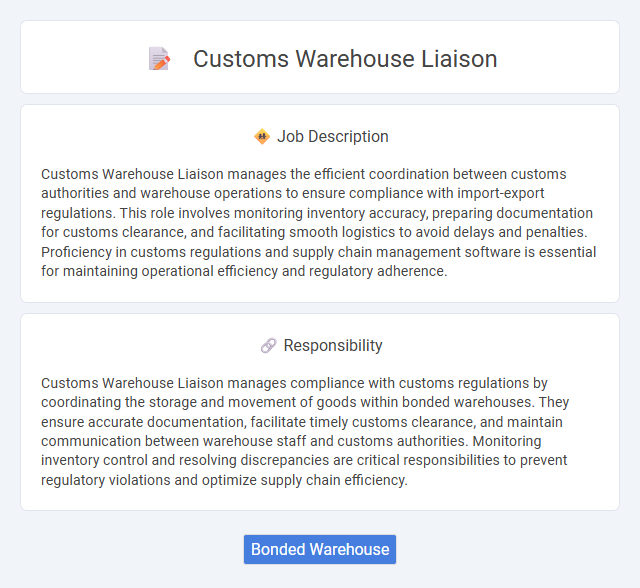
Customs Warehouse Liaison manages the efficient coordination between customs authorities and warehouse operations to ensure compliance with import-export regulations. This role involves monitoring inventory accuracy, preparing documentation for customs clearance, and facilitating smooth logistics to avoid delays and penalties. Proficiency in customs regulations and supply chain management software is essential for maintaining operational efficiency and regulatory adherence.
Individuals with strong organizational skills and attention to detail are likely to thrive in a Customs Warehouse Liaison role, as the job often requires managing complex documentation and ensuring compliance with regulations. People who can handle high-pressure environments and communicate effectively with customs officers and warehouse staff may find themselves well-suited to the position. Those who prefer routine tasks without much interaction or adaptability might struggle to meet the demands of this dynamic and detail-oriented role.
Qualification
A Customs Warehouse Liaison requires in-depth knowledge of customs regulations, warehouse management, and logistics coordination. Candidates must possess strong communication skills, attention to detail, and proficiency in customs software and documentation processes. Experience in supply chain operations and compliance with international trade laws is essential for ensuring seamless customs clearance and inventory control.
Responsibility
Customs Warehouse Liaison manages compliance with customs regulations by coordinating the storage and movement of goods within bonded warehouses. They ensure accurate documentation, facilitate timely customs clearance, and maintain communication between warehouse staff and customs authorities. Monitoring inventory control and resolving discrepancies are critical responsibilities to prevent regulatory violations and optimize supply chain efficiency.
Benefit
Customs Warehouse Liaison roles likely offer significant benefits such as enhanced expertise in international trade compliance and customs regulations, which can improve job security and career growth potential. The position probably provides opportunities for developing strong relationships with customs officials and logistics partners, leading to smoother warehouse operations and faster clearance times. Employees may also benefit from competitive salaries and potential bonuses tied to efficient warehouse management and regulatory adherence.
Challenge
A Customs Warehouse Liaison likely faces the challenge of navigating complex regulatory requirements while ensuring efficient coordination between customs authorities and warehouse operations. The role probably demands strong problem-solving skills to handle potential delays and compliance issues with accuracy. Managing real-time communication and documentation may present ongoing obstacles in maintaining seamless import and export processes.
Career Advancement
Customs Warehouse Liaison roles offer significant career advancement opportunities by developing expertise in international trade compliance, customs regulations, and logistics coordination. Professionals who excel can progress to senior positions such as Customs Compliance Manager, Trade Operations Supervisor, or Supply Chain Director, leveraging their experience to lead critical import/export operations. Mastery in customs documentation and regulatory liaison enhances strategic decision-making capabilities, making this role a key stepping stone in global trade and supply chain management careers.
Key Terms
Bonded Warehouse
Customs Warehouse Liaison plays a crucial role in managing bonded warehouses by ensuring compliance with customs regulations and overseeing the secure storage of imported goods under bond. They coordinate with customs authorities to facilitate the movement, inspection, and documentation of goods, preventing duties from being paid until goods leave the warehouse. Expertise in customs laws and inventory management systems is essential for optimizing bonded warehouse operations and minimizing regulatory risks.
 kuljobs.com
kuljobs.com